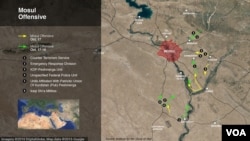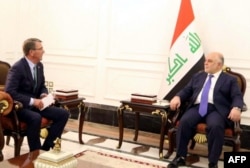Iraqi forces shelled areas outside of Mosul Monday, as their offensive to retake the country's second-largest city from Islamic State militants entered its second week.
The attacks were focused near Bartella, about 15 kilometers east of Mosul. Iraqi forces as well as Kurdish fighters have been moving through small towns to the east and south of Mosul as they work their way closer to the city itself.
Brett McGurk, special envoy for the U.S.-led coalition that has been conducting airstrikes against Islamic State targets for two years, posted Monday on Twitter that after the first week "all objectives met thus far."
Also Monday, Human Rights Watch called for an investigation into an airstrike last week that killed at least 13 people at a mosque near the city of Kirkuk. That strike came during an assault by Islamic State fighters believed to be aimed at distracting Iraqi troops from the battle around Mosul.
The rights group said the evidence it examined was consistent with an airstrike, but also noted that the area was within shelling range of Kurdish and Islamic State positions.
U.S. military spokesman Col. John Dorrian said the coalition had "definitively determined" its forces were not responsible for the airstrike. The Iraqi government said it was investigating the attack.
Kurdish commanders claimed major advances Sunday in Bashiqa, located just north of Bartella, including saying their fighters had entered the town. Journalists, however, were not allowed entry, and the status of the town had not been confirmed by early Monday.
Carter in Irbil
The advances occurred as visiting U.S. Defense Secretary Ash Carter held talks in nearby Irbil with Kurdish leader Masoud Barzani and key military commanders.
Carter was later quoted as saying "they [peshmerga] fight extremely well. But because they're fighting hard, they suffer ... casualties."
After separate talks Saturday in Baghdad with Iraqi Prime Minister Haider al-Abadi, Carter also said Washington is prepared to provide additional support for the Iraq-led coalition if requested by Iraq and U.S. commanders.
Carter, who met Friday with Turkish President Recep Tayyip Erdogan, is seeking to ease rising tensions between Ankara's Sunni leadership and Baghdad's Shi'ite government.
The two governments have been feuding over the presence of more than 1,000 Turkish fighters deployed near Bashiqa late last year to train Sunni and Kurdish fighters in the push against Islamic State. That Turkish force provided artillery cover for the Peshmerga advance on Sunday.
Turkey-Iraq border
The December 2015 deployment was also widely seen as an attempt by Turkey to ensure that its border with Iraq remains largely controlled by Sunnis and Iraqi Kurds rather than by Iran-backed Shi'ite militia currently fighting alongside Iraqi forces to retake Mosul.
For its part, the Baghdad government has repeatedly demanded the withdrawal of all Turkish forces from the country, a demand that Turkey has so far ignored.
The verbal standoff peaked Saturday when Iraqi Prime Minister Abadi formally rejected a demand by Turkey to participate in the military push to recapture Mosul.






